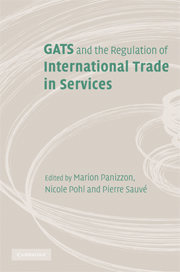Book contents
- Frontmatter
- Contents
- Contributors
- List of figures
- List of tables
- List of abbreviations
- Preface
- PART 1 Beyond regulatory control and multilateral flexibility: Gains from a cosmopolitan GATS
- PART 2 Unexplored economic, political and judicial dimensions of GATS
- PART 3 The limits of request–offer negotiations: Plurilateral and alternative approaches to services liberalisation
- PART 4 GATS case law: A first assessment
- PART 5 Market access, national treatment and domestic regulation
- PART 6 Unfinished business: Safeguard and subsidy disciplines for services
- PART 7 Challenges to the scope of GATS and cosmopolitan governance in services trade
- PART 8 Conclusion
- 27 Been there, not yet done that: Lessons and challenges in services trade
- Index
- References
27 - Been there, not yet done that: Lessons and challenges in services trade
from PART 8 - Conclusion
Published online by Cambridge University Press: 03 September 2009
- Frontmatter
- Contents
- Contributors
- List of figures
- List of tables
- List of abbreviations
- Preface
- PART 1 Beyond regulatory control and multilateral flexibility: Gains from a cosmopolitan GATS
- PART 2 Unexplored economic, political and judicial dimensions of GATS
- PART 3 The limits of request–offer negotiations: Plurilateral and alternative approaches to services liberalisation
- PART 4 GATS case law: A first assessment
- PART 5 Market access, national treatment and domestic regulation
- PART 6 Unfinished business: Safeguard and subsidy disciplines for services
- PART 7 Challenges to the scope of GATS and cosmopolitan governance in services trade
- PART 8 Conclusion
- 27 Been there, not yet done that: Lessons and challenges in services trade
- Index
- References
Summary
Background considerations
Judged against almost any qualitative or quantitative benchmark, the negotiated opening of services markets has proven fiendishly difficult, leading almost invariably to disappointing outcomes. These stand in stark contrast to the remarkable – and typically unilateral – opening that has otherwise characterised services markets across the globe over the past two decades.
The tendency for negotiated outcomes in services to fall short of expectations appears to hold regardless of the negotiating setting. The challenge of prying open services markets and of advancing unfinished rule-making challenges is indeed almost as intractable at the centre – i.e. under World Trade Organization's (WTO) General Agreement on Trade in Services (GATS) as it is at the burgeoning periphery of preferential trade agreements (PTAs) featuring Chapters on services and investment, despite the observed tendency for PTAs to achieve WTO+ outcomes in market-opening terms in a range of sectors.
For a while, in identifying the various forces that conspired to produce such results, one could credibly invoke the regulatory and negotiating precaution that novelty typically induces among risk-averse bureaucratic constituencies. Nothing, indeed, is scarier than a blank page, and that is essentially what the early pioneers in services confronted at the negotiating table.
The trade policy community has been grappling with services for just over two decades now. The jury is still out as to whether this is a long enough period from which to expect some measure of policy- and rule-making maturity to take root.
- Type
- Chapter
- Information
- GATS and the Regulation of International Trade in ServicesWorld Trade Forum, pp. 599 - 631Publisher: Cambridge University PressPrint publication year: 2008
References
- 7
- Cited by



